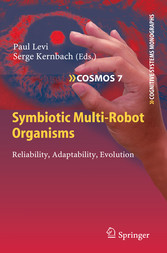Suchen und Finden
"Chapter 3 Cognitive Approach in Arti?cial Organisms (p. 165-166)
3.1 CognitiveWorld Modeling
Libor P?reu?cil, Petr ? St?ep´an, Tom´a?s Krajn´ik, Karel Ko?snar, Anne van Rossum, Alfons Salden The chapter introduces possibilities and principal approaches to knowledge gathering, preprocessing and keeping in autonomous mobile robots’ arti?cial organisms. These may comprise “classical AI” concepts as well as “new AI principles”, whereas both approaches themselves may bring up either major advantages, or suffer from certain drawbacks.
The classical approach relying on sensor-fusion-model-planning and actuation schema takes the advantage of explicit representation of the organism knowledge which may be represented by varied types of world model structure (Barrera, 2005). Subsequently, these structures are mainly understood as geometric and other environmental features carriers. Features and data are considered for explicit representation of world properties and typically have precisely known location, meaning and con?dence.
These properties serve for inputs to cognitive or planning subsystems allowing to execute reasoning processes over this data. Major advantages of this stand in predictable behaviors, strong data reduction ratio, and therefore better possibility of tracking and safety of the robot operation. The disadvantage of this class of methods remains in a stiff way of combining speci?c cognitive methods, typically capable of adjustment to slowly changing organism operating conditions.
Therefore, the process of adaptation/evolution to rapidly changing environment condition becomes a hard problem in this approach. The other approach aiming to store knowledge in an implicit form tends to be more ?exible in adaptation/learning and evolution aspects and ranges from Brooks’ principles to Neural Net knowledge representations. Hence, this advantage is balanced by unknown or fuzzy localization and form of particular knowledge.
Estimation of particular behaviors and possibility of their determination remains low. Moreover, due to undetermined meanings of particular knowledge/data components, ef?cient ?ltration of data amounts becomes ineffective. The leading target in here stands in elaboration of novel approaches to representation of world knowledge based of combination of selected features of the above mentioned methods. A hybrid approach, that combines strong data amount reductions and easy understanding of a World Map content with high ?exibility of the “new AI” principles is proposed."
Alle Preise verstehen sich inklusive der gesetzlichen MwSt.








